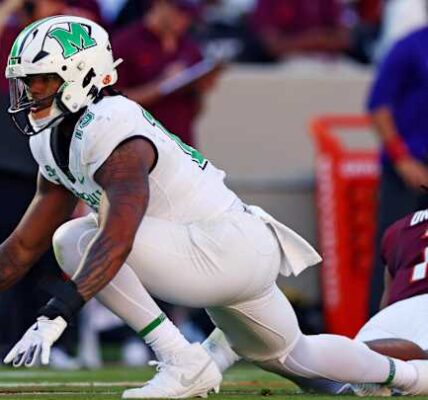Breaking down and debunking four prevalent takes after the Lions’ Divisional Round exit.
When a season as highly-anticipated as the 2024 Detroit Lions’ ends in such a shocking and abrupt fashion, it’s bound to spark anger.
The Lions—Super Bowl favorites for much of the year—fell short. They didn’t just miss the Super Bowl; they failed to reach the NFC Championship game or win even one playoff game. For fans and players alike, it’s a bitter and unacceptable outcome.
With frustration still simmering among the fanbase—and some NFL analysts—there’s been a wave of emotionally-driven, irrational takes on the Lions’ season.
While I also needed time to process the loss, enough time has passed to reassess things more clearly. Let’s address and dismiss some of the misguided opinions that have surfaced following Detroit’s stunning loss to the Washington Commanders.
Jared Goff isn’t good enough to win a Super Bowl This argument highlights one of the biggest problems in sports discussions: overanalyzing postseason performances.
Players and coaches are often judged by their championship moments, but this leads to exaggerated conclusions based on a limited number of games.
Josh Allen and Lamar Jackson, for example, are frequently criticized for playoff shortcomings, despite being undisputed top-five quarterbacks who have led teams to conference championships.
Goff has faced similar criticism throughout his career. While his overall resumé isn’t on the level of Allen’s or Jackson’s, Goff has proven he can deliver in the playoffs.
He’s reached two conference championships and was one dropped pass away from a second Super Bowl appearance last year.
These achievements were fueled by offenses he led, as demonstrated by the DVOA rankings for the teams he’s played on:
2017 Rams: First in scoring, 12th in points allowed (0-1 playoffs)
2018 Rams: Second in scoring, 20th in points allowed (2-1 playoffs, lost Super Bowl)
2020 Rams: 22nd in scoring, first in points allowed (1-1 playoffs)
2023 Lions: Fifth in scoring, 23rd in points allowed (2-1 playoffs, lost NFC Championship)
2024 Lions: First in scoring, seventh in points allowed (0-1 playoffs)
In four of these five runs, Goff directed a top-five offense. On three occasions, he played with bottom-half defenses, including the 2024 Lions, whose defense struggled late in the season.
Statistically, Goff’s playoff numbers may seem underwhelming: 61.2% completion rate, 2,450 yards, 9 TDs, 5 INTs, and an 85.1 passer rating across 10 games.
However, this is a small sample size. Last postseason, Goff excelled, completing 77-of-111 passes (69.4%) for 837 yards, 4 TDs, 0 INTs, and a 103.3 passer rating.
His 52.1% success rate that postseason was higher than Patrick Mahomes (51.1%), Lamar Jackson (46.8%), and Brock Purdy (45.5%)—all quarterbacks who made the conference championships.
Call me optimistic, but when a quarterback produces MVP-caliber numbers in the regular season, has one of the best postseasons in 2023, and has carried teams to the brink of the Super Bowl twice, it’s clear he has what it takes when the right pieces are in place.
The Lions need a mobile quarterback to win it all I can understand this perspective. This year’s conference title games featured four quarterbacks with mobility as part of their game: Mahomes, Allen, Jalen Hurts, and Jayden Daniels.
There’s no denying that mobility challenges defenses and provides an edge—especially against playoff-caliber defenses. It’s a valuable trait.
That said, Goff and the Lions still led the league’s No. 1 scoring offense without a rushing quarterback. They were one half away from the Super Bowl last year without one. Two years before that, pocket passer Matthew Stafford won the Super Bowl.
Is it easier to win with a dual-threat quarterback? Absolutely. But the Lions’ best path forward is building a stronger, healthier defense to complement Goff, rather than starting over at quarterback in the hope of finding a generational talent.
Ben Johnson and Aaron Glenn were too distracted by head coaching opportunities
This is a baseless claim. Last season, both Johnson and Glenn interviewed for head coaching jobs during game weeks and still helped the Lions win two playoff games.
This year, their interviews took place during the bye week, when head coach Dan Campbell had given the staff time off. There was no game preparation involved at the time.
While it’s impossible to know if the coaches thought about their future opportunities during Commanders week, there’s no evidence to suggest it. Johnson shut down media questions about it, stating his focus was on the game.
Glenn—a former Pro Bowler and proven leader—wouldn’t have reached his level of success as a coach and player without being able to compartmentalize and prioritize his team.
Suggesting these coaches became selfish during what could be their final moments with the Lions is insulting to their dedication over the past four years.
The Lions are too aggressive to win playoff football
This narrative began after last season’s NFC Championship game, when fans and analysts unfairly blamed Dan Campbell’s fourth-down aggressiveness for the loss instead of the players’ failure to execute in key moments.
Since then, critics have been waiting for another high-pressure misstep to revive this talking point.
Campbell didn’t display any overt aggression against the Commanders, yet The Athletic’s Mike Sando still questioned his ability to succeed in playoff football.
In his column, he strangely blamed Campbell for the third-and-1 empty-set passing play that ended in a strip sack, the Jameson Williams trick play that resulted in an interception, and even argued that Goff’s forced throws were influenced by Campbell’s aggressive tendencies.
I’ll address these points in reverse. First, Goff has been one of the league’s most cautious quarterbacks.
He rarely takes deep shots (ranking 40th out of 43 in air yards) and avoids throwing into tight coverage. If anything, Campbell has emphasized ball security over risk-taking in coaching Goff.
The Williams trick play was undeniably poor. Its timing and design were indefensible. While Sando argues Campbell should have overruled the call—and he’s correct—Campbell’s strength lies in empowering his coordinators.
It’s inconsistent to criticize Campbell and Johnson for their aggression here while celebrating their creative play-calling all season.
The notion that trick plays fail in the postseason is simply untrue, as shown by Detroit’s two other successful trick plays that game, their NFC Championship reverse, and countless examples across the league.
As for the third-and-1 call, though telegraphing a pass with an empty backfield wasn’t ideal, the Lions got the matchup they wanted.
VAmon-Ra St. Brown was lined up against a linebacker, but the All-Pro slipped, and protection crumbled too quickly.
The play was designed to be a quick three-step drop, but everything went wrong. Blame lies more with execution than the play call.
For those wondering, “Why not just run the ball and ensure the first down?” It’s the same logic behind taking a shot on second-and-1.
The defense is vulnerable, and since the Lions planned to go for it on fourth-and-1 (as Campbell confirmed on Monday), the goal was to create a big play with limited risk. Unfortunately, that slim risk ended up costing them.




